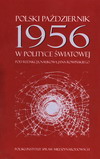Czechoslovakia and Poland in 1956: The Dog that Did Not Bark
Czechoslovakia and Poland in 1956: The Dog that Did Not Bark
Author(s): Igor Lukeš, Karel SieberSubject(s): Politics / Political Sciences
Published by: PISM Polski Instytut Spraw Międzynarodowych
Summary/Abstract: When a police inspector asked Sherlock Holmes for help with solving a crime, the detective suggested he should focus on the curious behavior of the dog during the crucial night. The bewildered inspector protested that the dog had done nothing at all. That, of course, was the point. The dog’s silence proved to be the key to solving the mystery. The Polish strikers, protesters, and reformers shook up the 1956 international scene. Their actions left deep imprints in the course of the Cold War. They overturned existing doctrines for politicians and political theories for academics. Ruling elites in many capitals had to reassess their assumptions about the nature of the east-west contest, its direction, likely duration, and outcome. But even a keen observer would have had to conclude that neither the bloody riots in Poznan in June 1956, nor the gathering of one million Polish Catholics at Jasna Góra in August, nor even the October 1956 events provoked any significant reaction in Czechoslovakia. It was a country that did not bark.1 This article seeks to discuss the Czechoslovak silence and to take the reader below the surface of the 1956 political scene in Prague. In the first part, we will show how the Czechoslovak power elite’s reaction to the Polish events appeared to the staff of the United States Embassy in Prague. In the second, we will document the impressions of the evolving Polish year 1956 upon the bosses of the Communist Party of Czechoslovakia (CPC) and the personnel of the Czechoslovak Embassy in Warsaw.
Journal: PISM Series
- Issue Year: 2007
- Issue No: 4
- Page Range: 153-174
- Page Count: 22
- Language: English

